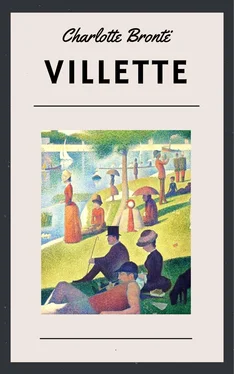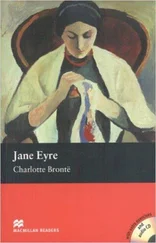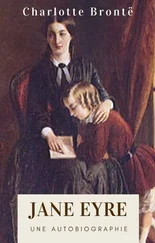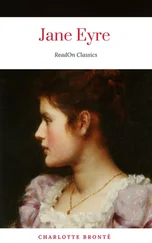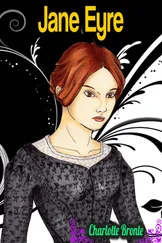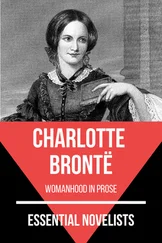Her lip trembled. I hastened to disclose the fact of a letter having been received, and to mention the directions given that she and Harriet should immediately rejoin this dear papa. "Now, Polly, are you not glad?" I added.
She made no answer. She dropped her book and ceased to rock her doll; she gazed at me with gravity and earnestness.
"Shall not you like to go to papa?"
"Of course," she said at last in that trenchant manner she usually employed in speaking to me; and which was quite different from that she used with Mrs. Bretton, and different again from the one dedicated to Graham. I wished to ascertain more of what she thought but no: she would converse no more. Hastening to Mrs. Bretton, she questioned her, and received the confirmation of my news. The weight and importance of these tidings kept her perfectly serious the whole day. In the evening, at the moment Graham's entrance was heard below, I found her at my side. She began to arrange a locket-ribbon about my neck, she displaced and replaced the comb in my hair; while thus busied, Graham entered.
"Tell him by-and-by," she whispered; "tell him I am going."
In the course of tea-time I made the desired communication. Graham, it chanced, was at that time greatly preoccupied about some school-prize, for which he was competing. The news had to be told twice before it took proper hold of his attention, and even then he dwelt on it but momently.
"Polly going? What a pity! Dear little Mousie, I shall be sorry to lose her: she must come to us again, mamma."
And hastily swallowing his tea, he took a candle and a small table to himself and his books, and was soon buried in study.
"Little Mousie" crept to his side, and lay down on the carpet at his feet, her face to the floor; mute and motionless she kept that post and position till bed-time. Once I saw Graham—wholly unconscious of her proximity—push her with his restless foot. She receded an inch or two. A minute after one little hand stole out from beneath her face, to which it had been pressed, and softly caressed the heedless foot. When summoned by her nurse she rose and departed very obediently, having bid us all a subdued good-night.
I will not say that I dreaded going to bed, an hour later; yet I certainly went with an unquiet anticipation that I should find that child in no peaceful sleep. The forewarning of my instinct was but fulfilled, when I discovered her, all cold and vigilant, perched like a white bird on the outside of the bed. I scarcely knew how to accost her; she was not to be managed like another child. She, however, accosted me. As I closed the door, and put the light on the dressing-table, she turned tome with these words:—"I cannot— cannot sleep; and in this way I cannot— cannot live!"
I asked what ailed her.
"Dedful miz-er-y!" said she, with her piteous lisp.
"Shall I call Mrs. Bretton?"
"That is downright silly," was her impatient reply; and, indeed, I well knew that if she had heard Mrs. Bretton's foot approach, she would have nestled quiet as a mouse under the bedclothes. Whilst lavishing her eccentricities regardlessly before me—for whom she professed scarcely the semblance of affection—she never showed my godmother one glimpse of her inner self: for her, she was nothing but a docile, somewhat quaint little maiden. I examined her; her cheek was crimson; her dilated eye was both troubled and glowing, and painfully restless: in this state it was obvious she must not be left till morning. I guessed how the case stood.
"Would you like to bid Graham good-night again?" I asked. "He is not gone to his room yet."
She at once stretched out her little arms to be lifted. Folding a shawl round her, I carried her back to the drawing-room. Graham was just coming out.
"She cannot sleep without seeing and speaking to you once more," I said. "She does not like the thought of leaving you."
"I've spoilt her," said he, taking her from me with good humour, and kissing her little hot face and burning lips. "Polly, you care for me more than for papa, now—"
"I do care for you, but you care nothing for me," was her whisper.
She was assured to the contrary, again kissed, restored to me, and I carried her away; but, alas! not soothed.
When I thought she could listen to me, I said—"Paulina, you should not grieve that Graham does not care for you so much as you care for him. It must be so."
Her lifted and questioning eyes asked why.
"Because he is a boy and you are a girl; he is sixteen and you are only six; his nature is strong and gay, and yours is otherwise."
"But I love him so much; he should love me a little."
"He does. He is fond of you. You are his favourite."
"Am I Graham's favourite?"
"Yes, more than any little child I know."
The assurance soothed her; she smiled in her anguish.
"But," I continued, "don't fret, and don't expect too much of him, or else he will feel you to be troublesome, and then it is all over."
"All over!" she echoed softly; "then I'll be good. I'll try to be good,
Lucy Snowe."
I put her to bed.
"Will he forgive me this one time?" she asked, as I undressed myself. I assured her that he would; that as yet he was by no means alienated; that she had only to be careful for the future.
"There is no future," said she: "I am going. Shall I ever—ever—see him again, after I leave England?"
I returned an encouraging response. The candle being extinguished, a still half-hour elapsed. I thought her asleep, when the little white shape once more lifted itself in the crib, and the small voice asked—"Do you like Graham, Miss Snowe?"
"Like him! Yes, a little."
"Only a little! Do you like him as I do?"
"I think not. No: not as you do."
"Do you like him much?"
"I told you I liked him a little. Where is the use of caring for him so very much: he is full of faults."
"Is he?"
"All boys are."
"More than girls?"
"Very likely. Wise people say it is folly to think anybody perfect; and as to likes and dislikes, we should be friendly to all, and worship none."
"Are you a wise person?"
"I mean to try to be so. Go to sleep."
"I cannot go to sleep. Have you no pain just here" (laying her elfish hand on her elfish breast,) "when you think you shall have to leave Graham; for your home is not here?"
"Surely, Polly," said I, "you should not feel so much pain when you are very soon going to rejoin your father. Have you forgotten him? Do you no longer wish to be his little companion?"
Dead silence succeeded this question.
"Child, lie down and sleep," I urged.
"My bed is cold," said she. "I can't warm it."
I saw the little thing shiver. "Come to me," I said, wishing, yet scarcely hoping, that she would comply: for she was a most strange, capricious, little creature, and especially whimsical with me. She came, however, instantly, like a small ghost gliding over the carpet. I took her in. She was chill: I warmed her in my arms. She trembled nervously; I soothed her. Thus tranquillized and cherished she at last slumbered.
"A very unique child," thought I, as I viewed her sleeping countenance by the fitful moonlight, and cautiously and softly wiped her glittering eyelids and her wet cheeks with my handkerchief. "How will she get through this world, or battle with this life? How will she bear the shocks and repulses, the humiliations and desolations, which books, and my own reason, tell me are prepared for all flesh?"
She departed the next day; trembling like a leaf when she took leave, but exercising self-command.
CHAPTER IV. MISS MARCHMONT.
On quitting Bretton, which I did a few weeks after Paulina's departure—little thinking then I was never again to visit it; never more to tread its calm old streets—I betook myself home, having been absent six months. It will be conjectured that I was of course glad to return to the bosom of my kindred. Well! the amiable conjecture does no harm, and may therefore be safely left uncontradicted. Far from saying nay, indeed, I will permit the reader to picture me, for the next eight years, as a bark slumbering through halcyon weather, in a harbour still as glass—the steersman stretched on the little deck, his face up to heaven, his eyes closed: buried, if you will, in a long prayer. A great many women and girls are supposed to pass their lives something in that fashion; why not I with the rest?
Читать дальше
